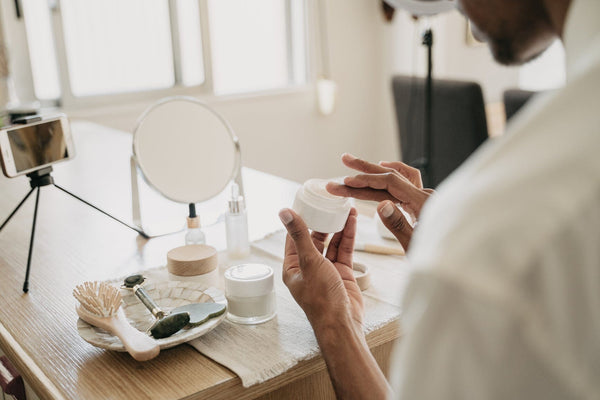Itching breasts may not be the best-known menopause symptom, or the most frequently experienced one; hot flashes and vaginal dryness typically win that award. But skin changes can become more common during the menopausal transition, which can include irritation and a frequent need to scratch around your breasts or nipples.
So, if your breasts are itching like crazy, read on. Here's what every woman should know about this relatively common annoyance and what you can do to get that urge to itch back under control.
Skin Changes and Itchy Breasts in Menopause
If you're wondering what perimenopause or menopause has to do with itching around your breasts, the answer may be: more than you might think.
The hormone estrogen plays a role in maintaining our skin’s health. As levels of estrogen shift and then decline during perimenopause and menopause, it's normal to notice changes to your skin, including the skin around your breasts.
Estrogen is involved in stimulating the production of certain types of proteins, mainly collagen and elastin, which help keep skin smooth and supple. When estrogen production declines, so do our skin's levels of these important proteins. This can cause skin to become thinner and drier, making it more prone to itching, sensitivity, and irritation.1,2,3 Some women may experience an uptick in these symptoms in one particular area of the body, like their breasts or nipples, particularly since nipple skin is thin and sensitive to begin with.
As the skin around your breasts may become more sensitive, you might notice that cold weather, certain fabrics, laundry detergents, or even personal care products start to trigger irritation or itching.
Hot flashes can make the problem worse. They can cause sweat to accumulate under your breasts, trapping moisture that may make your skin itchy or uncomfortable.4
Other Menopause Breast Changes
It's not just the skin around your breasts that can experience changes during perimenopause or menopause. Many women also notice that their breasts feel lumpier or more tender, particularly in the years leading up menopause, due to volatile fluctuations in estrogen. Often these symptoms ease up after menopause, once a woman's hormones stabilize at their new, lower levels.5
These kinds of textural shifts in your breasts aren’t particularly uncommon in your late 30s, 40s, or 50s. That said, it's always worth letting your healthcare provider know about any changes you notice in your breasts, just as a precaution.
How to Manage Itching Breasts
Self-care measures are usually enough to soothe dry skin around your breasts and ease the itch. However, if you’re looking for some more immediate relief for itching breasts, here are some things you can do to make your skin feel more comfortable, and keep it that way:6,7
- Take short, lukewarm showers or baths. Long, hot showers or baths can strip skin of its natural oils and exacerbate dryness and itching.
- Use a mild, fragrance-free body wash. Regular soap can be drying, and fragrances can be irritating for those who are sensitive.
- Slather on a moisturizer. Look for a lotion with hyaluronic acid or glycerin, which can help lock in moisture, especially on dry, itchy skin.
- Try a cool compress. Place a cool, damp washcloth on your nipples or breasts to soothe irritated or itchy skin.
- Manage chafing and sweat. Applying an anti-chafing cream, anti-chafing stick or even something like corn starch, can help prevent irritation if sweat under your breasts is making you itchy. Consider avoiding talc containing products.8
- Wear a comfortable, cotton bra. Tight bras and synthetic fabrics can further irritate sensitive breast skin and make you itch. Try to steer clear of anything that feels too rough to the touch.
- Be mindful when plucking hairs: Occasionally hairs may grow around the areola, the fleshy mound of pigmented skin on the breast. If you choose to pluck them, take meticulous care to avoid irritation.
- Use a humidifier. If you notice your itching gets worse during the cold, dry months, adding moisture to your indoor air can help.
- Manage hot flash triggers. If your itching seems to happen after a hot flash, avoiding common triggers (like caffeine, spicy foods, or alcohol) can make a difference.
- See a dermatologist. Sometimes perimenopause or menopause can trigger or worsen symptoms associated with skin problems, like eczema.9 If itching around your breasts or elsewhere is hard to manage on your own, consider seeking out help from a skincare professional.
Is Breast Itching During Menopause Ever Something to Worry About?
While drier or more sensitive skin is not uncommon during perimenopause or menopause, in rare instances, certain skin changes around the breasts or nipples could be a sign of breast cancer or other serious conditions.
Let your healthcare provider know if you're experiencing persistent itching around your breasts, especially if it's accompanied by redness, darkening, scaling, swelling, or dimples on the skin, and is only around your breasts or nipples.10 You can discuss your symptoms and determine if further testing or treatment is necessary.
Resources
- https://www.aad.org/public/everyday-care/skin-care-secrets/anti-aging/skin-care-during-menopause
- https://www.aad.org/news/2020-02-11-how-to-care-for-your-skin-during-menopause
- https://www.cancer.gov/types/breast/breast-changes/understanding-breast-changes.pdf
- https://www.cancer.gov/types/breast/breast-changes/understanding-breast-changes.pdf
- https://www.cancer.gov/types/breast/breast-changes/understanding-breast-changes.pdf
- https://www.aad.org/public/everyday-care/itchy-skin/itch-relief/relieve-itchy-skin
- https://www.aad.org/news/2020-02-11-how-to-care-for-your-skin-during-menopause
- https://www.cancer.org/cancer/risk-prevention/chemicals/talcum-powder-and-cancer.html
- https://eczema.org/information-and-advice/living-with-eczema/menopause-and-eczema/
- https://www.cancer.gov/types/breast/breast-changes/understanding-breast-changes.pdf








